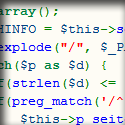|
ssergE posted:Not necessarily a webapp, but mainly server-side apps that use things like queues, topics, persistence, etc. Either of those choices (Seam or Spring) would be good. I personally use Spring a lot and I like it, but maybe I'm just used to it.
|
|
|
|

|
| # ? May 9, 2024 17:53 |
|
Not sure if this is the place for GWT discussion, but I figure I'll give it a whirl. I'm new to Java, but familiar with pascal and PHP  I have a main google webapp class, and a secondary class, which handles all the XML getting. One function within this XML class has a callback which fires when the XML is received from the server. I would like all this call-backing to be handled within the XML class, and for a function to be triggered within the main class when it's all done, so it can update the web GUI. The XML get is async, so I can't feed the XML as a function result, and OO structure prevents the secondary class calling a function in primary. (right?) In the world of windows GUI, the window would handle the event easily, but in this wilderness, I'm left stuck for ideas. Am I missing something blindingly obvious here?
|
|
|
|
Fruit Smoothies posted:Not sure if this is the place for GWT discussion, but I figure I'll give it a whirl. I'm not sure I fully understand what you are trying to accomplish, but here is an example as to how to update a UI component after the server sends the answer back: code:As you can see, from an inner class you can access private members of the enclosing class. If you want to have a completely separate class that handles the server communication, its possible to do it too. The MainClass would just have to expose a method "public void setTextBoxData(String text)" that would be called by the server communication class (that class would obviously need a pointer to the MainClass). Does this help?
|
|
|
|
rhag posted:Does this help? Unfortunately not. My issue was communicating between classes. I eventually found that an interface based on EventListener was the way forward. This annoyingly comment-less code tried to give me an understanding. I eventually implemented it, almost verbatim, but I really don't see the need to have an array of listeners. Surely, just the one would do? Thanks for your explanation and time. I apologise for my hideous explanation. EDIT: And that is the worst way of doing a loop I have ever seen. Fruit Smoothies fucked around with this message at 16:49 on Jun 16, 2009 |
|
|
|
Fruit Smoothies posted:Unfortunately not. My issue was communicating between classes. I eventually found that an interface based on EventListener was the way forward. Yes, one listener would do, in your case. But the code in there was providing a mechanism to have multiple listeners that can register themselves to be notified when an event occurs. If you are 100% sure that you will never need more than 1 listener, you can take out the array, and instead have just a variable "private SignInListener listener" with a set and get. Otherwise, you can leave the list of listeners in there, it won't hurt.
|
|
|
|
rhag posted:Yes, one listener would do, in your case. I don't see anywhere where the listeners are created... Making things in Java is one of the biggest confusions to me. It sounds silly, but I forget if i'm in a function, and don't need the "public" nonsense, or not. Then there's the weird syntax of "class classInstanceVar = ..." and not "name = class" as in other languages. Where it's currently code:code:
|
|
|
|
Fruit Smoothies posted:I don't see anywhere where the listeners are created... Based on your description earlier, your main class is your listener. code:placid fucked around with this message at 21:13 on Jun 16, 2009 |
|
|
|
placid posted:Based on your description earlier, your main class is your listener. Yeah, I get that bit. I know how the XML class is created, I didn't know, since SignInListener doesn't appear to be a class, whether or not it needed a constructor. If it does, I couldn't see one.
|
|
|
|
Fruit Smoothies posted:Yeah, I get that bit. I know how the XML class is created, I didn't know, since SignInListener doesn't appear to be a class, whether or not it needed a constructor. If it does, I couldn't see one. The SignInListener is not a class. Is an interface. Explanation here: http://java.sun.com/docs/books/tutorial/java/concepts/interface.html What you'll have to do is basically provide an implementation of that interface (can be the MainClass or an anonymous one) to the SecondaryXMLClass. placid showed you the situation when the MainClass is the SignInListener implementation. Here is the anonymous class method. Such as: code:
|
|
|
|
rhag posted:The SignInListener is not a class. Is an interface. Explanation here: http://java.sun.com/docs/books/tutorial/java/concepts/interface.html Yeah I've been looking around for Java information. The trouble is, I had no idea about this interfacing, since Delphi (  ) uses a windows-message-based event system IIRC. The lack of the "interface" keyword made it difficult to find things out. ) uses a windows-message-based event system IIRC. The lack of the "interface" keyword made it difficult to find things out.Your help is very much appreciated.
|
|
|
|
I finished my first year of CS about a month ago (only Java, up to Linked Lists, Objects, etc). Are there any reccommended books, tutorials, websites, or particular subjects that I should look in to? I'd like to keep working at it during the summer.
|
|
|
|
Capc posted:I finished my first year of CS about a month ago (only Java, up to Linked Lists, Objects, etc). Are there any reccommended books, tutorials, websites, or particular subjects that I should look in to? I'd like to keep working at it during the summer. Is there a particular project you want to work on or an idea you want to follow?
|
|
|
|
Capc posted:I finished my first year of CS about a month ago (only Java, up to Linked Lists, Objects, etc). Are there any reccommended books, tutorials, websites, or particular subjects that I should look in to? I'd like to keep working at it during the summer. Where do you want to go? I can recommend Wrox published books as a great place to learn. They seem to mix good software engineering and have good explanations. However, if you want to learn about a particular item of interest in programming, I can taylor a better recommendation to you.
|
|
|
|
In an effort to accomplish what I was trying to do on the previous page, I have decided to allow there to be a huge amount of JSP's. I'm up to about 20 at the moment and it's growing by the week. Oh well though, I'll make other people maintain them. New problem though...I am using struts nested tags to either populate the forms for editing or print the forms for originally submission. Does anyone have any experience with these? I am using an ActionForm with ArrayLists that are being nested and I keep getting either null pointers or indexoutofbounds in the struts code and not in mine. Is there some format to these nested java beans that I'm not understanding?
|
|
|
|
I'm not sure exactly where I'd like to go from here. So far I've just enjoyed figuring out whatever terrible assignment they had us do for class, so I thought I'd keep going on my own this summer. What's the next logical step? What are some subjects that might be helpful or fun to learn?
|
|
|
|
Here's a few possible things to look at in the base API:
I'd suggest avoiding anything related to Java Enterprise Edition, EJB or the like until you're thoroughly acquainted with the basics. There's also a huge number of open source projects to look through. Robocode in particular is a good choice for beginner programmers.
|
|
|
|
Capc posted:What's the next logical step? What are some subjects that might be helpful or fun to learn? Otherwise, I'd suggest solving Project Euler problems or just learning about data structures like balanced binary trees, B-trees, tries, hash maps, implementing these is loads of fun. EDIT: Gah, I thought this was the general programming thread. The original point still applies though. hey mom its 420 fucked around with this message at 13:27 on Jun 19, 2009 |
|
|
|
I am writing an FTP client. I am testing downloading a jpg. When I download it, it looks all hosed up and when I examine it in a hex editor it seems only every 100th byte or so is messed up. Other than that the file is the correct size, the bytes seem to be in the correct order etc, its just that every 100th bit or so is messed up. my download routine, it looks hosed up because I'm still working on it and has some other things I tried commented out code:code:I will add that this seems to work for text files and small files. EDIT: I think the problem lies in that bufferedreader can not read a single byte, it reads ints instead. Even though I have not implemented the solution I will leave this up as I work so you can mock my code. EDIT2: I am an idiot and need to use DataInputStream instead of bufferedreader EDIT3: It worked Kaltag fucked around with this message at 14:57 on Jun 19, 2009 |
|
|
|
Kaltag posted:
But, but....why? Why not go the basic way of reading from a stream and writing into another? A way that works for any stream? code:For local file transfer a higher buffer means faster transfer (ideally the HDD is the bottleneck not the CPU). For network...its tricky since the speeds are not anywhere close to HDD speeds. usually 1k is just about enough.
|
|
|
|
Capc posted:I'm not sure exactly where I'd like to go from here. So far I've just enjoyed figuring out whatever terrible assignment they had us do for class, so I thought I'd keep going on my own this summer. Why not take a look at Google Summer of Code ? I believe the registrations are closed, but you can look at all the projects that applied, and get ideas from their projects. Maybe you can find something fun. Personally, for 4 days now I've been writing a yum file system (fuse, not in kernel). I found it fun. Would it be fun for you? Dunno.
|
|
|
|
rhag posted:But, but....why? Classes in the java.nio.channels package are even faster for reading/writing.
|
|
|
|
TRex EaterofCars posted:Classes in the java.nio.channels package are even faster for reading/writing. That is correct. But we must learn to walk before we can run.
|
|
|
|
rhag posted:Why not take a look at Google Summer of Code ? I believe the registrations are closed, but you can look at all the projects that applied, and get ideas from their projects. Maybe you can find something fun. It's closed, and it looks like something that would be just perfect for me to do. Anyone know of any alternatives?
|
|
|
|
thanks for the side read/write tip
|
|
|
|
Can someone help me understand how java passes in objects into functions? My previous understanding was that everything is passed by value and you can't pass by reference. But I'm working on this program where I'm using a union find data structure (it basically just holds a hashmap) and I'm doing something like this:code:Also, is there a good book or resource for how to make java code fast? I have a decent understanding of how to speed up code in c++ but not with java
|
|
|
|
almostkorean posted:Can someone help me understand how java passes in objects into functions? My previous understanding was that everything is passed by value and you can't pass by reference. That's correct, but what's being passed by value is a reference... To make it less confusing: below you say that you understand C++; well, saying Foo f = new Foo() in Java is about the same as saying Foo* f = new Foo() in C++. Similarly, every time you say SomeType st, you're declaring a variable that holds a pointer/reference to an object of that type.
|
|
|
|
almostkorean posted:Can someone help me understand how java passes in objects into functions? My previous understanding was that everything is passed by value and you can't pass by reference. But I'm working on this program where I'm using a union find data structure (it basically just holds a hashmap) and I'm doing something like this: simply put, objects are by reference and primitives are by by value not exactly but close enough
|
|
|
|
almostkorean posted:Can someone help me understand how java passes in objects into functions? My previous understanding was that everything is passed by value and you can't pass by reference. But I'm working on this program where I'm using a union find data structure (it basically just holds a hashmap) and I'm doing something like this: Any object in java, including array is passed by reference. Any primitive in java, is pass by value. The passing of uf into connectComponents is copying the reference to the object, and so when it dereference that copy, it gets the original object. This is exactly like C++'s reference operator. For your second question: http://www.cs.cmu.edu/~jch/java/speed.html covers many of the basics. However, before you start trying to write fast code: Are you sure your java code is not fast now? Do you need to make it faster? Do you know where your slowdown is. Is your algorithm optimal for the data sets it will be run on. Is it optimal for the hardware it will be run on?
|
|
|
|
almostkorean posted:
The one called the operand stack holds temporary values. These are pushed on top of the stack by copying a value from somewhere and removed from the stack by popping a value, giving it to something else. The other one called a stack frame holds values that were used to invoke the current method and the values of any local variables. This is a 0-based array. In the simple case, where your code resides in a class method and width, height and im are arguments, the method call goes like this:
|
|
|
|
HFX posted:For your second question: http://www.cs.cmu.edu/~jch/java/speed.html covers many of the basics. However, before you start trying to write fast code: I just want to note that this page is extremely out-of-date and that much of its advice is now wrong. For example, in many cases on modern JVMs, System.arraycopy is not faster than using a loop.
|
|
|
|
rjmccall posted:I just want to note that this page is extremely out-of-date and that much of its advice is now wrong. For example, in many cases on modern JVMs, System.arraycopy is not faster than using a loop. Probably is. I usually find people who try to make java faster or more efficient end up making it worse. Really the JVM has gotten quite good at what it does. I know it is hard for C++ people to give up some of those habits of trying to optimize everything, but really learn to trust in the compiler and runtime enviroment. This actually goes pretty well for C/C++ with more modern compilers. HFX fucked around with this message at 01:15 on Jun 25, 2009 |
|
|
|
I'm pretty new to Linux and I currently have Eclipse installed. I'm trying to implement a part of speech tagger and I'm having a lot of trouble. I want to install a package from http://nlp.stanford.edu/software/tagger.shtml and just run some quick tests but I can't get the package to read with eclipse.
|
|
|
|
HFX posted:Probably is. I usually find people who try to make java faster or more efficient end up making it worse. Really the JVM has gotten quite good at what it does. I know it is hard for C++ people to give up some of those habits of trying to optimize everything, but really learn to trust in the compiler and runtime enviroment. This actually goes pretty well for C/C++ with more modern compilers. It sounds to me like the people you know which are trying to make their java code faster (and failing) are bad programmers. The only thing anyone should trust is a profiling tool which gives you hard answers to the questions of "Why is this application using this much CPU time and ram etc." Don't trust the compiler or JVM, trust your code profiler.
|
|
|
|
WalletBeef posted:It sounds to me like the people you know which are trying to make their java code faster (and failing) are bad programmers. The only thing anyone should trust is a profiling tool which gives you hard answers to the questions of "Why is this application using this much CPU time and ram etc." Well there is that too. Most people are terrible programmers. They will spend hours optimizing something that is completely pointless or worse premature optimize. Many of them try to fix programs on a linear speed basis where as thinking about it abstractly and having a better algorithm would suit them a whole lot better.
|
|
|
|
clock(3) is my profiler
|
|
|
|
I'm writing a Java application right now where several clients (around 40) play a simple game together. I'm going to start work on the server-client communication now, but before I start writing horrible code, I thought I'd ask here: I guess the simple straightforward approach would be to write a server thread with a while(true)-loop with socket.accept() and then start a new thread for every new connection. Those threads would then wait for messages from the clients somehow (input stream) and notify the server thread by calling a special method, which would then loop over all connected client threads and call a method in all client threads to write to the socket. But is this really the way to do this? Would it even work? Or are there ways in Java which would make this simpler and easier to maintain?
|
|
|
|
Fehler posted:I'm writing a Java application right now where several clients (around 40) play a simple game together. I'm going to start work on the server-client communication now, but before I start writing horrible code, I thought I'd ask here: It's possible to do it that way for small numbers of clients; have a main server thread that listens for connections and makes handler threads for each one, and then have the client threads read data, process it, send the output to each of the other clients and go back to read some more, but it gets pretty clunky as the number of clients goes up (40 clients sounds like you're getting into this range) and you'll have to spend a fair bit of time to make sure you don't run into any synchronisation issues. A nicer method is to use the java non-blocking io classes in java.nio. I won't write my own example because some fine people have done this already, but basically it lets you read from an unlimited number of sockets at the one time. Effectively the code asks which sockets have data ready to read on them, deals with them each in turn and then asks again. No need for multiple threads, no synchronisation issues and it scales far better than the original method.
|
|
|
|
Thanks for the link, but I'm not sure if will really help me. The way I understand the method, instead of keeping the connections to the clients open all the time, I would make the clients poll the server regularly. Wouldn't that cause even more load, since every client would have to send a request to the server every few 100 ms?
|
|
|
|
Fehler posted:Thanks for the link, but I'm not sure if will really help me. The way I understand the method, instead of keeping the connections to the clients open all the time, I would make the clients poll the server regularly. Wouldn't that cause even more load, since every client would have to send a request to the server every few 100 ms? It'll look a little different to that example, it'll probably require two threads, but the general principle is the same. You'll have a Selector object and a thread that is listening for connections and adding SocketChannels to the Selector. Then you'll have a second thread that asks the Selector for any Channels that are ready to be read. The SelectionKey determines the operation you're looking for, in that example it's set to ACCEPT but if you use READ then it'll return all the channels ready to be read.
|
|
|
|

|
| # ? May 9, 2024 17:53 |
|
While we're on the subject of sockets; I've always prefered async non-blocking. Can someone tell me why I should do sync blocking instead? Should I?
|
|
|





















